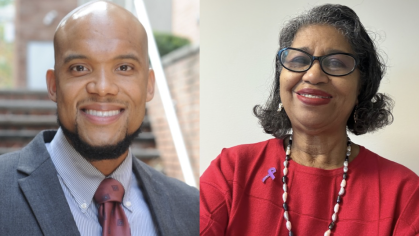
Laura Cuesta is an assistant professor at Rutgers School of Social Work. She discusses the significance of Hispanic Heritage Month and shares ways social workers and allied professionals can support Latina/o/x communities beyond this month.
Tell us a bit about your journey to social work.
From a very early age, I was aware of economic justice issues, mainly through the economic hardship my grandparents experienced and my observation of poverty across different communities in Colombia. I chose economics as my undergraduate major thinking that most people who were making decisions about social policies were economists. However, in my jobs as an economist—first in the design and implementation of social programs and later as a junior researcher—I was confronted with the discrepancy between economists’ responses to poverty and the experiences of families struggling to make ends meet. This led me to look for doctoral programs in social welfare policy, where social problems are best understood as multidimensional, and interdisciplinary research is encouraged. In 2009 I packed my bags and moved from Bogota, Colombia to Madison, Wisconsin to learn English (I was not fluent in English prior to 2010) and apply to doctoral programs in social policy. I was admitted into the Ph.D. in social welfare program at the University of Wisconsin—Madison in 2010, graduated in May 2015, and joined the faculty at Rutgers School of Social Work in July 2015. Since then, I have been dedicated to the pursuit of economic justice for families and communities worldwide through impactful scholarship, teaching, and service.
What is the significance of Hispanic Heritage Month for you?
According to the U.S. Census Bureau, we are a community of over 60 million people, representing about 19% of the total U.S. population, so Hispanic Heritage Month is a great opportunity for celebrating the contributions of the largest racial or ethnic group in the country. On a personal level, I believe this month-long celebration helps to strengthen our Latina/o/x community. We come from 33 countries in Latin America and the Caribbean, and I would argue we almost never identify as Latina/o/x, but as Colombian (like me), Mexican, Peruvian, etc. Hispanic Heritage Month truly brings our diverse communities together.
How can the social work community recognize and commemorate Hispanic Heritage Month?
Social workers should be aware of the diversity of Latina/o/x populations. As I mentioned before, Hispanic Heritage is linked to 33 countries, so while there is a shared history and culture, there are also country-specific experiences that play a role in the challenges faced by each community. We are not serving Latina/o/x populations well when we ignore their diversity.
What can the social work profession or social workers do to continue to support Latina/o/x communities beyond Hispanic Heritage Month?
Social workers, especially those working in areas with large Latina/o/x populations, should be able to provide culturally informed services to these communities. Here at the School of Social Work we are contributing to this goal with the Latina/o/x Initiatives for Service, Training, and Assessment (LISTA) Certificate Program. However, we are one of the few programs in the nation offering this opportunity to future social workers. We need more programs like LISTA throughout the US. Schools of social work also have an important role to play in supporting Latina/o/x communities by increasing the share of Latina/o/x full-time faculty. According to the Council of Social Work Education (CSWE), 19% of students enrolled in BASW programs and 15% of students enrolled in MSW programs identify themselves as Latina/o/x, but only 7.6% of full-time faculty members in 513 programs across the US are Latina/o/x. We need to support Latina/o/x people pursuing careers in social work education.
This story was created in partnership with Rutgers School of Social Work's Inclusion, Intersectionality, Diversity, Equity, and Advancement (IIDEA) Committee.



